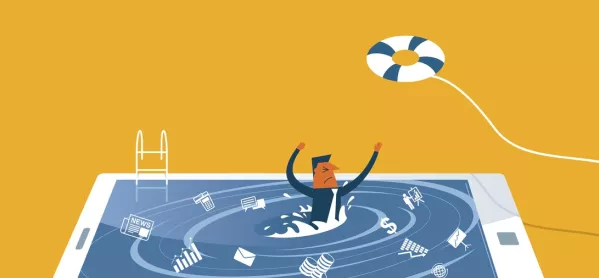- Home
- Three ways to avoid the wellbeing pitfalls of the digital world
Three ways to avoid the wellbeing pitfalls of the digital world

As a wellbeing coach, I have been able to witness the growing impact of the digital world on teachers and I now recognise some immediate concerns and sources of anxiety.
For example, I helped a teacher who had become so involved with social media platforms that it had a negative impact on the time they could spend offline re-charging: she was never “off” and it caused serious issues. Another teacher had been struggling to manage a double-digit number of emails landing in their inbox on a daily basis. Another teacher felt forced to quit social media because of a number of negative comments directed at them.
It is not uncommon for professionals to be dealing with a number of issues arising online at the same time, brought to the forefront by their own and other people’s interactions and behaviours in the digital world.
So what could we do to safeguard our wellbeing in the world of developing technology and ever-increasing online interactions?
Digital communication can be overwhelming, but like real-life communication, we must recognise the warning signs, set boundaries and put a stop to unhealthy relationships, whether it’s with technology or people in our virtual worlds. There are three ways to achieve this:
1. Manage your inbox
Emails have been a fast and convenient way of communication for a while, but have we managed to fully adopt a healthy approach when dealing with emails from our colleagues, parents, pupils or any websites we might have subscribed to? The truth is that they can consume a huge chunk of our time - and many of us have more than one email address to manage. Some ways to manage this include:
- Reduce the number of emails you receive: unsubscribe from unwanted emails. Something that was relevant to you a year ago might not be relevant any longer.
- Establish set times when you are going to deal with the rest. Be realistic, the times need to work for you. Don’t open an email if you don’t have time to deal with it. If you do click on it, mark it as “unread”: this way you won’t forget to deal with it later.
- Use the “three Ds” rule: delete, delegate, do.
2. Manage the time you spend on social media
Social media can be a valuable CPD tool. We can connect with like-minded professionals and learn a great deal fast. We can network, share resources and ideas, find inspiration and set our professional souls on fire, bringing renewed enthusiasm and passion into our classrooms.
However, the amount of information social media contains can be overwhelming. Everything seems to be important and urgent, so make sure that you gain clarity and focus. Ask yourself:
- What exactly are you trying to achieve or find?
- How much time can you realistically spend researching without jeopardising your other tasks?
- How is this information going to improve your practice?
3. Manage your relationships in the virtual world
These relationships - on Twitter or other social media - can be a great source of support and comfort, especially if you are going through a hard time at work or home. Many teachers I worked with went as far as to say that they found them therapeutic because they were able to be more open with people who were detached from their current situations.
However, there is a dark side to this. By doing so repeatedly, we put ourselves in danger of creating addiction that will have a negative impact on our wellbeing. We create an illusion of the wellbeing, a ‘‘second life’’ to hide stress or lack of fulfilment in our real lives instead of concentrating on dealing with the root of the problem. In their book The Digital Invasion: How Technology is Shaping You and Your Relationships, Dr Archibald D Hart and Dr Sylvia Hart Frejd suggest that ‘‘Addictions remove us from our true feelings, providing a form of escape from the unpleasant aspects of life. In many cases, one uses the Internet excessively to cope with social situations that are out of control.’’
In this fast-moving, action-oriented world of digital invasion, we become easily reachable and vulnerable, prompted consistently to get involved in conversations, answer questions, respond to requests or comment. If not managed properly, our digital lives can add more pressure to our already full and fast-paced real lives, leaving no time for self-care, reflection, contemplation or mediation and becoming another source of anxiety instead of providing true support and inspiration.
Maria O’Neill is an advanced skills teacher, eSafety co-ordinator and head of PSHE. She is also a wellbeing coach, PhD student researching wellbeing and personal development, and founder of @HealthyToolkit and @UKPastoralChat.
Want to keep up with the latest education news and opinion? Follow Tes on Twitter and like Tes on Facebook
Keep reading for just £1 per month
You've reached your limit of free articles this month. Subscribe for £1 per month for three months and get:
- Unlimited access to all Tes magazine content
- Exclusive subscriber-only stories
- Award-winning email newsletters



